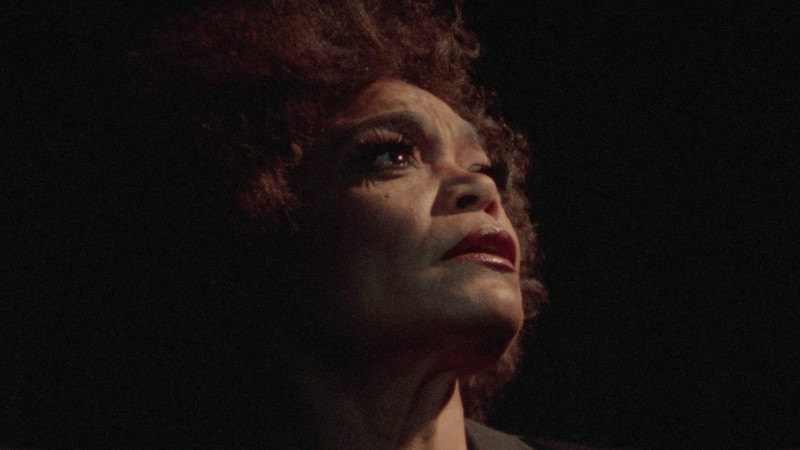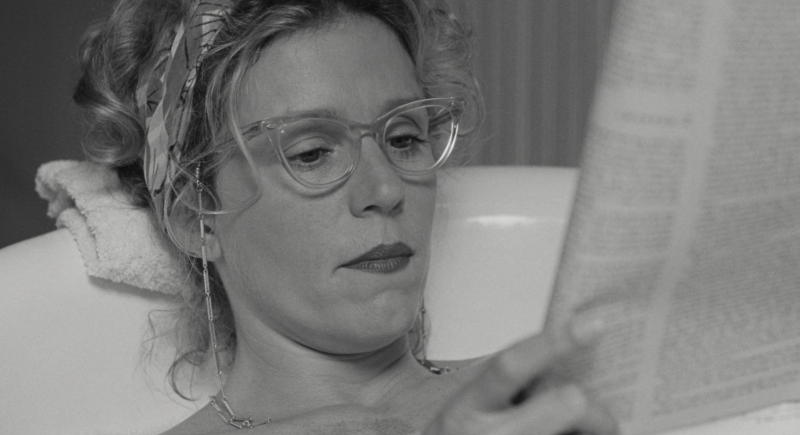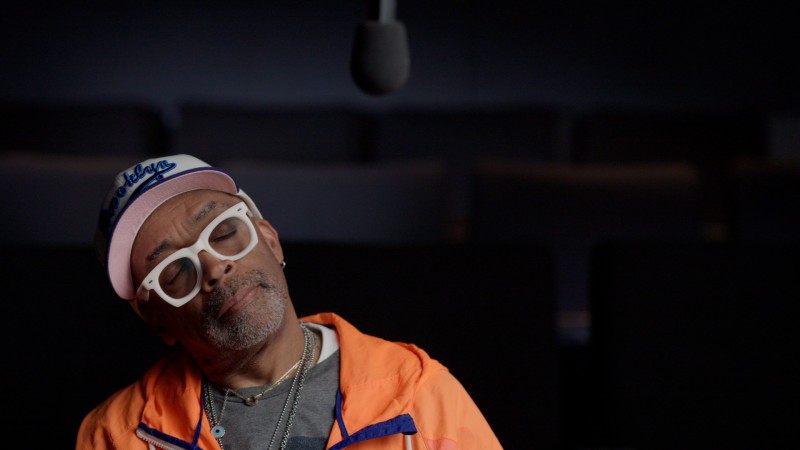Dukie

The following piece, written (under his pen name, Robert Traver) by John Voelker, author of the novel on which Otto Preminger’s Anatomy of a Murder is based, originally appeared in the August 6, 1967, edition of Voelker’s Detroit News Sunday Magazine column, the Traver Treatment. It is posted here courtesy of and copyright Kitchie Hill, Inc., with special thanks to Grace V. Wood.
Duke Ellington and I first met in my old DA office in the county courthouse of my Upper Peninsula home bailiwick as a blizzard raged outside. Otto Preminger was then using my former office as his headquarters during the filming of the courtroom scenes of the movie he was making from my novel, Anatomy of a Murder, and I happened to be there with him when the Duke walked in.
“Dukie!” Otto shrilled, turning on his old-world charm, swiftly introducing us and planting the Duke in a chair across from himself at my wide old leather-topped brass-studded DA desk. “How vas you twip?”
Duke glanced out the window at the pelting March blizzard and closed his eyes. His train had arrived three hours late, his luggage had got sidetracked, and we knew it was his sixtieth birthday. His look told me that the addition of an old-fashioned U.P. blizzard was simply too much frosting on his birthday cake.
“How vas you twip?” Otto repeated from the prosecutor’s chair.
Despite the heat from the hissing and clanking radiators (why do all courthouse radiators clank?), Duke seemed to shrink further into the voluptuous camel’s-hair coat in which he sat muffled and swathed as in a too-large kimono. “Ah, Otto,” he said in that low purring voice, “my trip was regrettably unforgettable. Let’s say that a miracle occurred and I am here.”
“Fine, Dukie, fine,” said Otto, to whom raging March blizzards were passing annoyances to be taken in stride, like the occasional poutings and vapors of recalcitrant actors. “Now, about the sveet music for my motion picture . . .”
Otto had commissioned the Duke to write the music for the movie, and Duke and a selected group from his band were to appear in several scenes. The two men had much to talk about and I discreetly arose to go.
“My dear Judgie,” Otto said gently, looking at me reproachfully with those little-boy blue eyes that could, when they wanted, penetrate one’s very soul, “you know ve haf no secrets from each odder. Pleese remain.”
“Yes, Otto,” I said meekly, plumping back in my chair, turned suddenly to stone.
As the two men talked along, professionally and knowledgeably, I clapped on my lay-analyst’s wig and, in the helpless fashion of writers the world over, studied the eternal enigma of personality presented by this interesting new specimen that had swum into my ken, using the same old crude tools: by observing words, gestures, silences, the eyes, yes, especially the eyes.
The man emanated, I swiftly saw, much the same suavity and subtle brand of weary disillusion as did the actor George Sanders. As I sat listening and watching, I gradually felt drawn to him, not because I savor disillusion, but rather because I sensed that, in his case at least, it masked great sensitivity and pride and even, however finely veiled, a vein of melancholy and loneliness.
If I am guessing right, I reflected, how could these last two qualities help but be present in any sensitive and intelligent Negro American? (No, you’ve got it wrong, Judgie, I swiftly amended—in ANY Negro American?) Here was I, the grandson of an immigrant German brewer who could, if the gnats of ambition sufficiently gnawed me that way (which heaven forbid), aspire to any public office in the land. And there was Duke, whose ancestors had probably preceded mine here by centuries, who . . .
“I vill giff you this shooting script so you can see, Dukie,” Otto said.
“Yes, Otto,” Dukie said. “I’ve got a little old tune going already. You stimulate me, Otto.”
In this world-envied land of opportunity—I continued to muse—should not, indeed, must not any real concept of equal rights contain also the stuff of equal dreams? Wasn’t daring to hope and aspire and to dream fairy dreams all part of this abused word equality? And did not we reduce and scar any people among us who dared not dream the dreams of all of us?
Meanwhile, Otto and Dukie talked away in their professional Sanskrit as I half listened with polite incredulity. Yes, both men were real pros. Suddenly their interview was over; I woke from my reverie; Otto had turned on the charm again.
“They tell me it’s your birthday today, Dukie,” Otto said, blue-eyed and beaming. “How old vas you?”
“Ah, Otto,” the Duke responded gallantly, his eyelids fluttering ever so imperceptibly, “as our old friend Jack Benny says, today I’m just thirty-nine.”
“Many happy returns, Dukie,” Otto said, rising. “If I veren’t so busy I vould bake you a cake.”
I cleared my throat to speak and the Duke turned his eyes sorrowfully on me. After all, I was the man who had written the book that had prompted the movie that had lost Duke his luggage, and I felt bound to say something to this poor man stranded in a blizzard in my native U.P. on his sixtieth birthday.
“Mr. Ellington,” I said, doing some lightning calculation, “I have long admired your many musical talents, but never before had I realized that when I heard and saw you with Ethel Waters in Chicago years ago in The Blackbirds of 1931 you were only eleven. Congratulations, sir.”
“Ah, thanks, Judgie,” the Duke swiftly came back, never batting an eye. “I guess I was one of those bediapered child prodigies like Mr. Mozart. And would you believe it, dear Judgie, when I composed my ‘Black and Tan Fantasy’ I was a mere child of nine?”
Just like that . . .
The Dukie smiled and I smiled, and I saw that, presto, we had become friends. Otto was on long distance—to both New York and Hollywood—and we two left together. Out in the crowded corridor the Duke stole another pained look at the swirling blizzard outside.
“One thing puzzles me, Judgie,” he said with infinite gloom.
“Yes, Dukie?”
“How did you ever survive this charming climate long enough to write a book?”
“Don’t worry, Dukie—someday it will go away. We have the loveliest summers in the world.”
Duke had scarcely been sold. “Ah, yes, Judgie—everything will go away someday. It’s the waiting that’s so exquisitely wearing.”
Dukie stayed at the attractive three-story colonial inn in my hometown, which the movie brass had all but taken over, and it was here on the hotel’s grand piano that he composed the music for the movie. I began haunting the place, as I love the piano, loved the way Duke played it, and moreover had never before watched music being composed.
It was all fascinating, but it cost me some sleep. The Duke’s hours were as unusual as his exclusive diet of steak and grapefruit. He worked mostly after midnight and slept a good part of the day. At Otto’s invitation I was on the movie set every morning trying, along with Joseph N. Welch, to keep the Perry Mason syndrome to a minimum, trying also to make like a judge, and checking in around midnight for my nightly vigil with the Duke.
“How’s Otto’s movie coming?” the Duke asked me one night. Watching a movie being made is like witnessing an exercise in planned chaos, and as I pondered his question the Duke gave me my answer. “Ah, but then I suppose, Judgie,” he purred along, “that when a man pays one a fortune to make a movie out of one’s book, one’s critical detachment becomes—shall we say?—a bit warped.”
“I’ll stand on my constitutional rights,” I said.
He waved me to sit beside him at the piano. “Try sittin’ on ’em, Judgie. Be my guest.” And then he was off and away, while I sat there enthralled.
We shared some tastes in common. One night a Greek wardrobe girl in charge of costumes for the movie dropped by for a spell. Dukie played some of his new things for her and called her Aphrodite and was so utterly charming and gallant I could scarcely believe he WAS thirty-nine. When she left on Cloud Seventeen he turned to me and said: “The ways of Hollywood are indeed dark and mysterious, Judgie. That pent tigress of a girl is by all odds the most dynamic and totally attractive female in the entire company. Der Dukie haf sprachen!”
“I couldn’t agree more, Dukie,” I said fervently. In my absentminded judicious fashion I had concluded precisely the same thing long before the Duke had arrived with his blizzard . . .
We shared another taste in common: the Duke took an immediate fancy to the woman I had so fancied I had married, and named one of his lovely new compositions for her, the “Grace Valse.” And Grace liked Dukie and invariably called him Edward after she learned that his name was Edward Kennedy Ellington.
I play the piano by ear after a fashion—in fact even better, I’m told, after several old-fashioneds—and on my den wall is a picture taken by Gjon Mili showing the Duke and me seated at the hotel grand playing one of our midnight duets. I treasure the picture and wish I’d made a tape of at least one of our epic duets.
Speaking of tape recordings, one night near the end of Duke’s stay, Grace and I threw him a party at our house. Besides Otto and his lady, Joe and Agnes Welch were there, as was Jimmy Stewart and the one and only Gjon Mili, the photographer, with his wild thatch of hair and his inevitable turtleneck sweater. After we had eaten, Otto and Mili sank deep into one of their gin rummy games, which to behold was not unlike watching the collision of opposing naval armadas, all guns ablaze. I kept trying to steer Duke in to the piano, but Duke was held fascinated by this raging battle of mutual invective and insult.
“Do you have a tape recorder, Judgie?” Dukie whispered.
“Yes, but I can’t work the damn thing,” I whispered back.
“I’ll show you,” Dukie whispered.
He swiftly showed me and, surreptitiously, we recorded some of the grimmer battle scenes and suddenly began playing them back.
“Mee-lee, you are vun deceitful rat!” the tape player obediently repeated. “Preminger, you are a grasping avaricious Viennese peasant,” and so on to the end. It broke up the game and we moved into the living room. “Do your stuff, Judgie, I’m about to play a little thing,” Dukie whispered.
When we were all settled—with Otto and Mili tactfully placed at opposite ends of the room—the Duke announced he was going to play something for us that had never before been heard in America.
“You mean from my new motion picture?” Otto put in.
“No, Otto. It’s a piano suite I composed and recorded on commission from the Queen of England,” Duke said. “I sent her the master record and made no copies or tapes, and I will now play it from memory.” He turned to me, “Are you ready, Judgie?”
I nodded and leaned forward ecstatically.
For the next hour, or so it seemed, Duke held us enchanted. Even Otto remained wordless, which may possibly be enchantment raised to new heights. It was jazz and yet it was not jazz. It was haunting, lovely, nostalgic, evocative . . . Before I get too maudlin or in over my waders I’d better settle by simply saying: It was as though a latter-day Debussy had combined and arranged variations on “Greensleeves” and a haunting Negro spiritual in a subtle jazz idiom. And now an inspired Duke we hadn’t known before was playing it like an angel.
As he played on and on I thought I detected some of the disquiet and longing that I sensed occasionally afflicted the man. Despite its lilt, there was a poignancy and sadness in this music that I felt reflected the man. Put most crassly, here was the world-famous popular public entertainer, however sophisticated, who had perhaps always wanted to play the musical equivalent of Hamlet; here too was an enormously talented man who had spent nearly a lifetime playing his heart out for an assortment of often frivolous people who frequently couldn’t have cared less, who often as not probably regarded him more as a sort of droll, sophisticated, and faintly decadent colored mountebank than as the greatly gifted authentic American talent that he is.
Our hushed little group was not listening to Dukie that night; we were privileged to listen to Edward Kennedy Ellington, a serious and immensely gifted American composer, arranger, and pianist. His concert ended abruptly and he turned beaming to Grace and me.
“There, you dear people,” he said, “you now possess something which only Her Majesty has.”
“How do you mean?” I asked, perplexed.
“But you made a tape of it, didn’t you, Judgie?”
I ruefully bit my lip. “I—I—Dukie,” I floundered. “Your music was so damned lovely I clean forgot to do anything but listen.”
He airily waved a hand. “I’ll record it someday and send you a copy.” The Duke left the next morning, but he never did send the record. Instead, he sends us gay billboard-sized Christmas cards in March. But I console myself: at least I was Queen for an hour.




